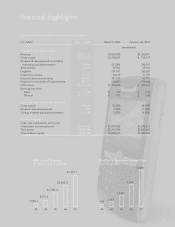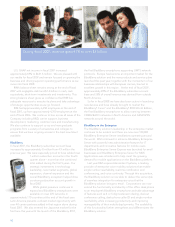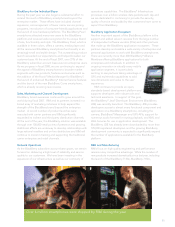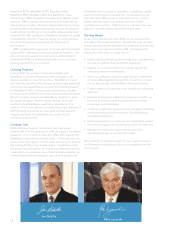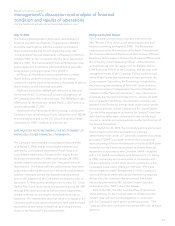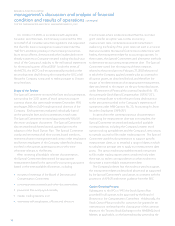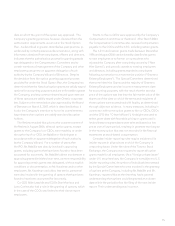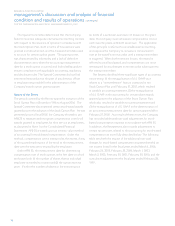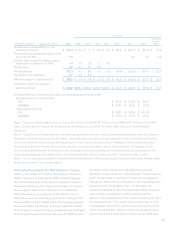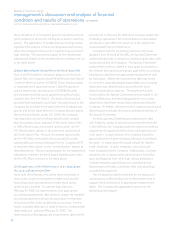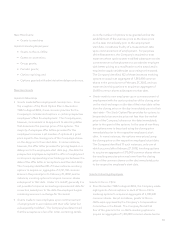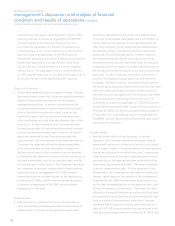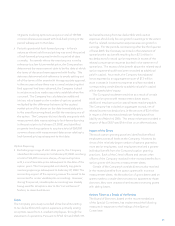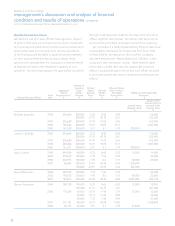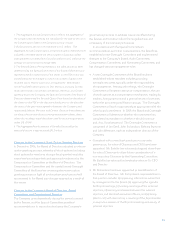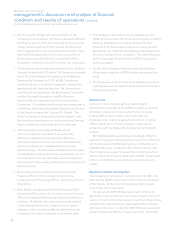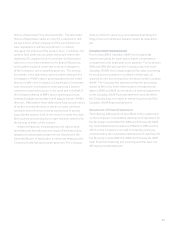Blackberry 2007 Annual Report Download - page 17
Download and view the complete annual report
Please find page 17 of the 2007 Blackberry annual report below. You can navigate through the pages in the report by either clicking on the pages listed below, or by using the keyword search tool below to find specific information within the annual report.15
date on which the grant of the option was approved. The
Company’s granting practices, however, deviated from the
authorization requirements as set out in the Stock Option
Plan. As described in greater detail below, past practice, as
evidenced by contemporaneous documentation, along with
information obtained from employees, officers and directors,
indicates that the authorization process for granting awards
was delegated to the Compensation Committee and to
certain members of management of the Company and other
employees pursuant to an apparent delegation of such
authority by the Company’s Board of Directors. Despite
the deviation from the option granting approval process
provided for under the Stock Option Plan, the Company has
determined that the historical option grants are validly issued
options for accounting purposes and are enforceable against
the Company, and any common shares issued upon exercise
of these options are validly issued under Ontario corporate
law. Subject to the remediation plan approved by the Board
of Directors on March 2, 2007, which is described below, it
is also the Company’s intention to honor its commitment to
issue shares when options are validly exercised by option
holders.
The Review revealed that prior to the commencement of
the Review in August 2006, all stock option grants, except
grants to the Company’s co-CEOs, were made by or under
the authority of co-CEO Jim Balsillie or his delegate in
accordance with an apparent delegation of such authority
by the Company’s Board. For a number of years after
the IPO, Mr. Balsillie was directly involved in approving
grants, including grants that have been found to have been
accounted for incorrectly. Mr. Balsillie’s direct involvement in
approving grants diminished over time, as more responsibility
for approving certain grants was delegated, without explicit
conditions or documentation, to Mr. Kavelman and to other
employees. Mr. Kavelman and other, less senior, personnel
were also involved in the granting of options that have been
found to have been accounted for incorrectly.
Co-CEO Mike Lazaridis and COOs Don Morrison and
Larry Conlee also had a role in the granting of options, which
in the case of the COOs was limited to their direct report
employees.
Grants to the co-CEOs were approved by the Company’s
Compensation Committee or the Board. After March 2003,
the Compensation Committee also reviewed compensation
payable to the COOs and the CFO, including option grants.
The 3,231 stock option grants made between December
1996 and August 2006 can be broadly classified as grants
to new employees or to former co-op students who
rejoined the Company after completing university (“New
Hire Grants”), and periodic awards to existing employees
and directors, including grants awarded to employees
following a promotion to a more senior position (“Grants to
Existing Employees”). The Special Committee determined
that some New Hire Grants and the majority of Grants to
Existing Employees used an incorrect measurement date
for accounting purposes, with the result that the exercise
price of the options was less than the fair market value of the
shares as of the date on which the terms and recipients of
those options were ascertained with finality, as determined
through objective evidence. In many instances, including in
connection with some option grants to the co-CEOs, COOs
and the CFO (the “C-level officers”), hindsight was used to
select grant dates with favorable pricing on grants and in
limited instances grant dates were selected based on low
prices over a future period, resulting in grantees receiving an
in-the-money option that was not recorded in the financial
statements as stock-based compensation.
Canadian insider reporting rules require insiders to file
insider reports in all provinces in which the Company is
a reporting issuer. Under the rules of the Toronto Stock
Exchange, the Company was required to report all option
grants made for all employees. (As a “foreign private issuer”
under U.S. securities laws, the Company is not subject to U.S.
insider reporting rules.) A number of individuals interviewed
by the Special Committee who were involved in the granting
of options at the Company, including Mr. Balsillie and Mr.
Kavelman, reported that at the time they had a general
understanding that options could be granted at a chosen
date within the period before the filing of the next insider
report. Their understanding was incorrect.






